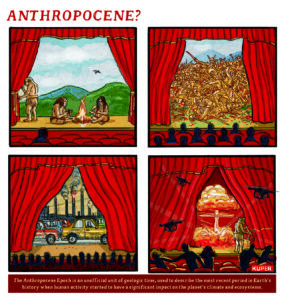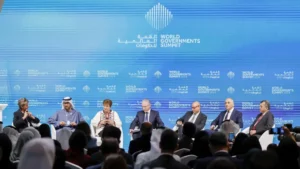Poorest Nations Say Yes to Emissions Cuts
The Group of Least Developed Countries, a key partner in the long-running United Nations climate talks, is willing to agree to the industrialized world's core demand on cutting greenhouse gas emissions.
By Alex Kirby, Climate News NetworkThis piece first appeared at Climate News Network.
LONDON — In what could be a far-reaching move, the world’s poorest countries say they are now prepared to commit themselves to binding cuts in their emissions of greenhouse gases.
The move has the potential to quicken the pace of the glacially-slow UN negotiations, which have for years been trying to agree an effective way to cut emissions in order to avoid runaway climate change.
The Group of Least Developed Countries (LDCs) is a major negotiating bloc at the UN talks, with its member states including 12% of the world’s people..
Whether its willingness to accept cuts will in fact hasten the birth of a new and comprehensive climate agreement will now depend largely on the good faith and commitment of the richer countries.
Quamrul Chowdury is a lead climate negotiator of the LDC Group. He told the Climate News Network: “Prakash Mathema, the current Chair of the LDCs in the climate negotiations, has a new mantra: ‘Follow us’.
“That means the 49 LDCs under his leadership are set to act in the process as a very pro-active group. They will lead by example – by doing. The LDCs are no longer waiting for others to act.
“I think the LDCs are now for low carbon pathways for all. They are even ready to go first in helping to cut back global greenhouse gas emissions, though they are the ones least responsible for increasing those emissions.”
Asked whether this meant that the LDCs now accepted the need for binding emissions cuts by all signatories to the international climate treaty, the Kyoto Protocol, and not just by industrialised countries, Chowdury said it did.
“All countries should commit [to accepting cuts], but developing countries’ National Appropriate Mitigation Actions [NAMAs] should be supported”, he said.
NAMAs are policies and actions which countries undertake as part of their commitment to reduce emissions. The term, developed by the UN negotiators, recognizes that different countries may act in different ways based on equity and on their shared but differing responsibilities and abilities – in other words, the contribution they have made to climate change.
NAMAs do not involve governments making the sort of binding commitments which the LDCs say they will now accept. They do stress the importance of financial help from developed to developing countries to help them to reduce emissions.
Mr Chowdury’s statement that the LDCs now accept that all countries should make binding emissions cuts is a significant diplomatic step forward.
It has been the developing world’s refusal to accept that it is responsible for helping to solve a problem it did not cause that has allowed some industrialised countries, notably the US and Australia, to refuse to commit themselves to internationally-agreed cuts.
Chowdury added: “The LDCs are for raising ambitions over climate change mitigation, because mitigation is the ultimate adaptation. And adaptation has its limits.
“The cost of adaptation is also rising every day as the most industrialised countries are not slashing their emissions, except for some of the European good boys. But that is not enough.
“Major emitters need to scale up their efforts. They also need to do more to stabilise the global temperature well below 2°C [a widely accepted global threshold].
“LDCs are also doing some adaptation, and they are showing global leadership here. Bangladesh, Nepal and Mozambique are shining cases of successful on-the-ground adaptation.
“Those cases should be scaled up and replicated. Others can learn from the LDCs how to face climate adversities day in and day out.”
Mr Chowdury’s statement goes to the heart of one of the most divisive issues in the negotiations: who should move first by cutting emissions?
A number of developed countries argue that they will make cuts only when the LDCs do so, despite the fact that it is industrialisation and development that have largely caused the human contribution to climate change.
Until now the LDCs have insisted that they should not be asked to accept binding cuts because they have contributed so few emissions to the total now in the atmosphere.
Prakash Mathema’s mantra, urging the LDCs to set an example others can follow, could alter the terms of the entire debate.
Your support matters…Independent journalism is under threat and overshadowed by heavily funded mainstream media.
You can help level the playing field. Become a member.
Your tax-deductible contribution keeps us digging beneath the headlines to give you thought-provoking, investigative reporting and analysis that unearths what's really happening- without compromise.
Give today to support our courageous, independent journalists.






You need to be a supporter to comment.
There are currently no responses to this article.
Be the first to respond.